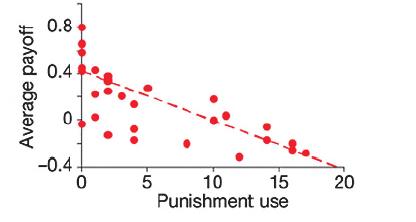Do nice guys really finish last? In baseball, there is an old saying that nice guys finish
Question:
Do nice guys really finish last? In baseball, there is an old saying that “nice guys finish last.” Is this true in the competitive corporate world? Researchers at Harvard University attempted to answer this question and reported their results in Nature (Mar. 20, 2008). In the study, Boston-area college students repeatedly played a version of the game
“prisoner’s dilemma,” where competitors choose cooperation, defection, or costly punishment. (Cooperation meant paying 1 unit for the opponent to receive 2 units; defection meant gaining 1 unit at a cost of 1 unit for the opponent;
and punishment meant paying 1 unit for the opponent to lose 4 units.) At the conclusion of the games, the researchers recorded the average payoff and the number of times punishment was used for each player. A graph of the data is shown in the accompanying scatterplot.
a. Consider punishment use (x) as a predictor of average payoff (y). Based on the scatterplot, is there evidence of a linear trend?
b. Refer to part
a. Is the slope of the line relating punishment use (x) to average payoff (y) positive or negative?
c. The researchers concluded that “winners don’t punish.”
Do you agree? Explain.
Step by Step Answer:

Statistics Plus New Mylab Statistics With Pearson Etext Access Card Package
ISBN: 978-0134090436
13th Edition
Authors: James Mcclave ,Terry Sincich





